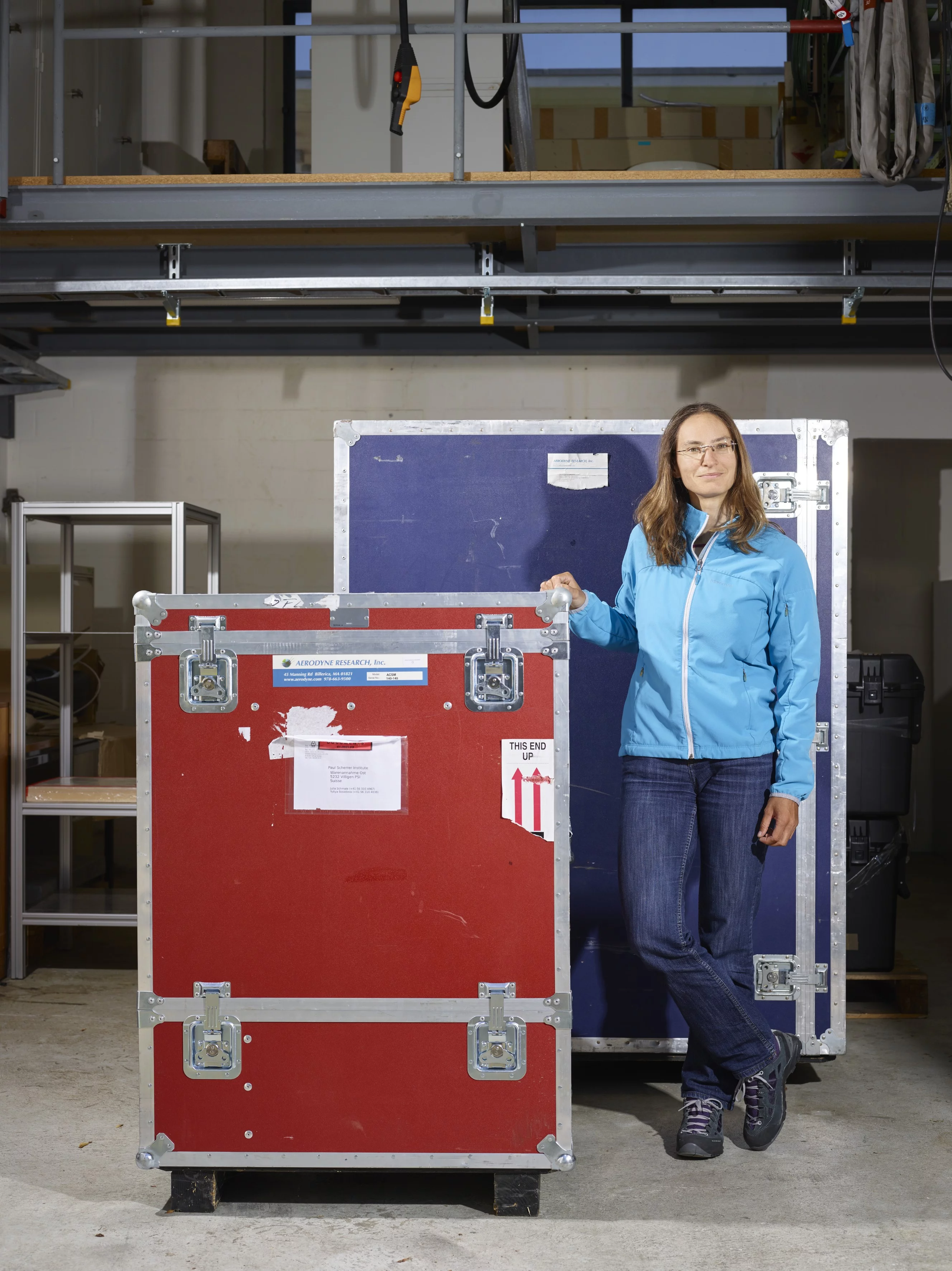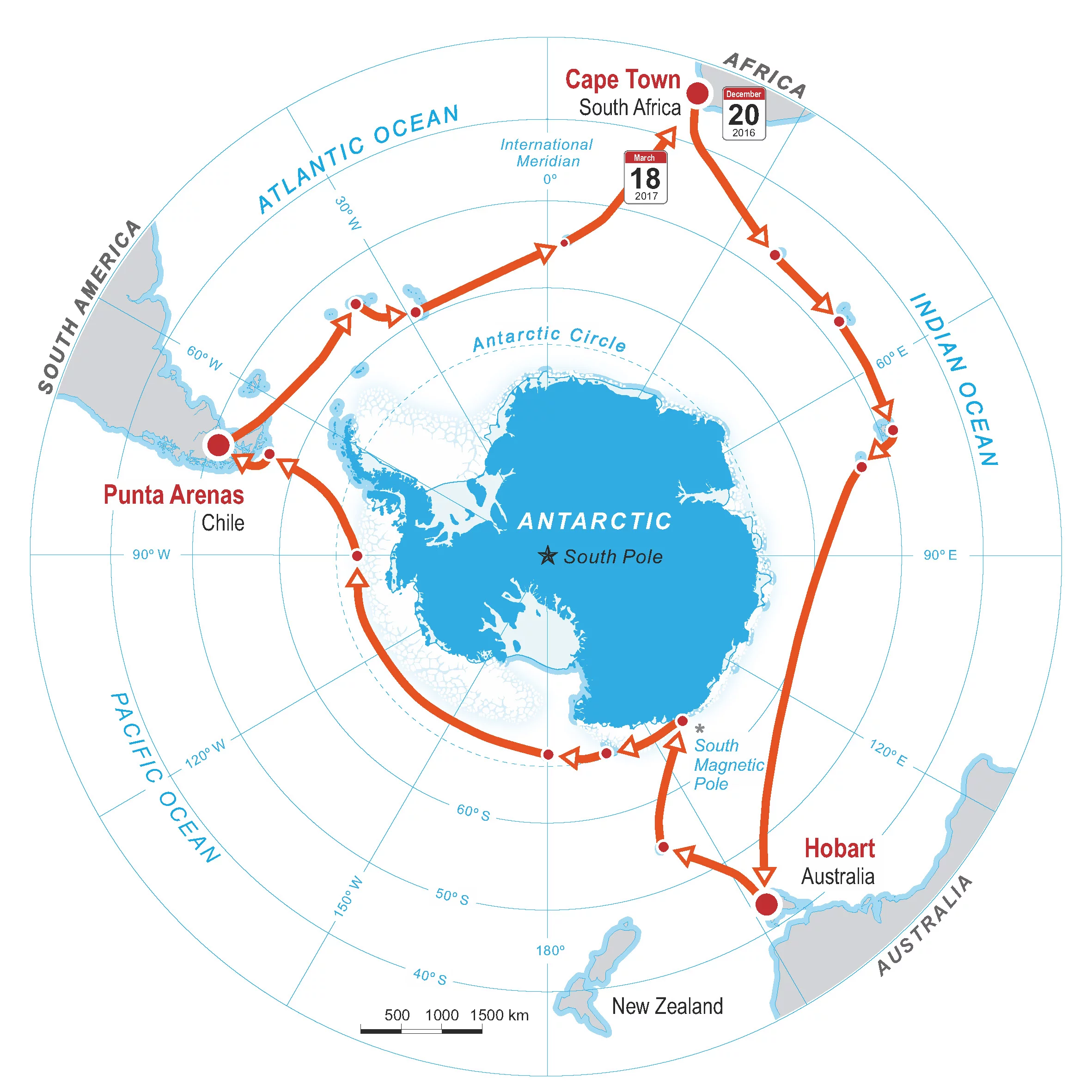Atmospheric scientist Julia Schmale is starting out, together with more than fifty other researchers, on a three-month research cruise around the Antarctic. There she and her small team from the Paul Scherrer Institute will collect air samples and data to make it possible to better distinguish between the influences of anthropogenic and natural particulates on climate in the future.
Julia Schmale sits upright in her office chair at the PSI and glances at the wall: There hangs an A3 sheet of paper showing the Antarctic and a sinuous red line around it. The young researcher has an ice-blue weatherproof jacket hanging on the back of her chair, grey-purple track shoes on her feet. She looks as if she’s on her way to work out or go on an adventure.
The sheet on the wall holds the promise of just such an adventure. Explaining the red line, Schmale says: We are boarding in Cape Town on the 20th of December 2016 and won’t land there again for three months.
During that time Schmale, more than fifty other researchers, and a comparable number of crew members will sail around the Antarctic on the Russian research vessel Akademik Tryoshnikov. They will disembark in Australia and in Chile, on several islands, and on the continent of Antarctica. In short: clockwise around the South Pole.
This will be no pleasure cruise or photo safari: It is the Antarctic Circumnavigation Expedition (ACE), organised by the newly established Swiss Polar Institute. Glaciologists on the expedition will bore into the ice to take samples, biologists will study Antarctic microorganisms, and climate researchers will gather data on local weather conditions and their impacts on the global climate. It is very interdisciplinary; I’m looking forward to this broadening of horizons
, Schmale says.
Even though this will be Schmale’s longest expedition to date, it’s not her first: She has already been under way in Greenland and Kyrgyzstan, in Puerto Rico and Nepal, and on the remote subantarctic Bird Island. We will also drop by Bird Island on the upcoming expedition — a little reunion that I’m already looking forward to.
Air pollution and climate change
Schmale is an atmospheric researcher at the PSI. She studied environmental engineering and even then was most fascinated by the courses on atmospheric chemistry. Nearly everything that humans do leads to the emission of air pollutants
, she explains. When we drive the car to go shopping, when we cook and heat our buildings, when our garbage is hauled away, and naturally when we fly on a vacation trip: All of this releases gases and particulates into the air.
Modern filtering technology can only capture part of it. That has consequences. Researchers have shown that among environmental hazards, air pollution is the number-one cause of death worldwide, surpassing malaria and inadequate hygiene. Millions of people die prematurely because of air pollution
, Schmale states.
For the optimistic researcher, this large number also indicates great potential: There’s an incredible amount that can be done — improving air quality can also raise the quality of life for enormous numbers of people.
In addition, air pollution and particulates contribute to climate change. In that connection, Julia Schmale’s research has a special focus on how particulates interact with clouds. Clouds play a major role in the heat budget of Earth’s climate. But just how anthropogenic particulates change the properties of the clouds has not yet been resolved with sufficient precision.
In search of preindustrial air
To be able to quantify the influence of anthropogenic particulate pollution, researchers also need reference values — that is, measurements in clean air. Wind and air circulation, however, transport anthropogenic particulates everywhere. There’s not one spot on our planet any more where preindustrial conditions prevail
, Schmale says, and one can see how strongly she wishes the opposite were true. Yet for particulate researchers, it could be worse: After a certain time, particulates are removed from the atmosphere. In the remote Antarctic, therefore, it is possible to obtain samples that are very similar to preindustrial air.
In this way, Schmale and her team want to figure out the composition of the air in preindustrial times. In conjunction with satellite data and computer models, the researchers will create an analytical basis for better determination of anthropogenic changes in the air and in the climate. With that, they want to deliver a concrete contribution to the next global climate report.
Isn’t she worried about suffering from cabin fever during the long expedition? It certainly won’t be easy
, Schmale admits. Naturally, the scope for movement on the ship is small, and there won’t be much variety.
On the ship the young researcher, who enjoys bicycling over alpine passes and running marathons, will have much less freedom of movement than she likes.
That’s why books will take the place of bike and trainers in her personal luggage. I would like to finally read about the Antarctic expeditions of Shackleton, Scott, and Amundsen
, says Schmale. And I’m sure we modern expedition members will have some stories and adventures to tell.
Text: Paul Scherrer Institute/Laura Hennemann
Contact
Dr. Julia Schmale, Aerosol Physics Group, Laboratory for Atmospheric Chemistry,Paul Scherrer Institute, 5232 Villigen PSI, Switzerland
Telephone: +41 56 310 4967, E-mail: julia.schmale@psi.ch [German, English]
Prof. Dr. Urs Baltensperger, Head of the Laboratory for Atmospheric Chemistry,
Paul Scherrer Institute, 5232 Villigen PSI, Switzerland
Telephone: +41 56 310 24 08, E-mail: urs.baltensperger@psi.ch [German, English]


